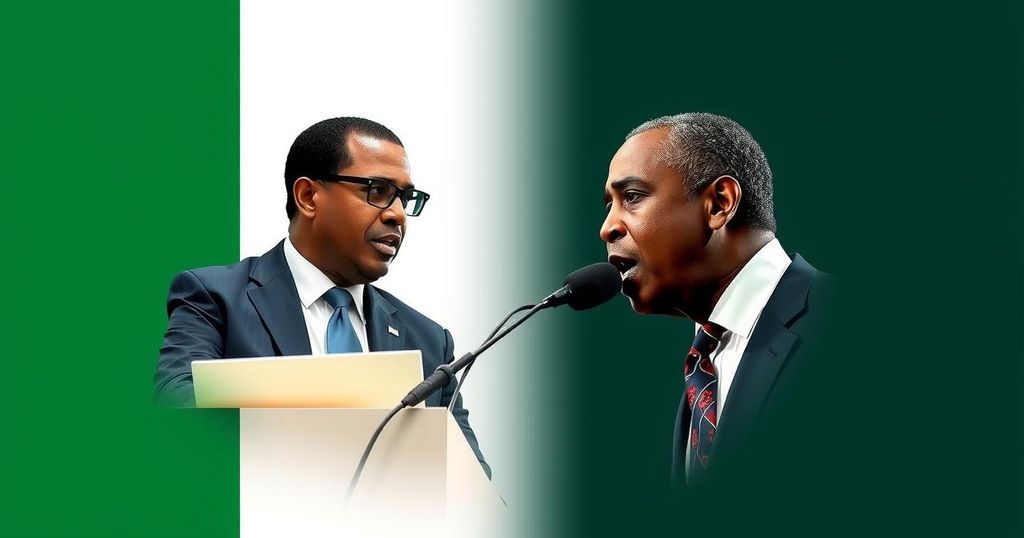Reflections on Electoral Losses: A Nigerian’s Perspective on U.S. Politics

The conclusion of the U.S. presidential election has prompted reflections akin to those following Nigeria’s contentious political landscape. The article discusses the difficulties faced by citizens in accepting electoral losses, particularly referencing the experiences of Nigerians. It highlights the detrimental impact of divisive politics on societal well-being and underscores the importance of humility and unity among leaders to foster healing and trust in democracy.
The conclusion of the United States presidential election has prompted various reflections, particularly from those whose preferred candidates did not emerge victorious. Adjusting to electoral outcomes, however challenging, is crucial for fostering political stability. Having experienced a similar disappointment during Nigeria’s 2015 elections, where I supported Goodluck Jonathan against Muhammadu Buhari, I understand the struggle of accepting unfavorable results. Jonathan’s loss marked the beginning of a tumultuous period under Buhari’s leadership, culminating in my support for Peter Obi in the subsequent 2023 elections. My hope was that Obi would transcend the corruption and disillusionment pervasive within Nigerian politics, but he too was defeated.
Obi’s loss was a bitter pill to swallow, and like many Nigerians, I felt robbed when legal challenges to the election results proved futile. This political atmosphere bears parallels with the recent U.S. election, where Donald Trump faced significant legal challenges yet secured a victory amid accusations of misconduct. Both cases reflect broader societal issues concerning moral integrity in leadership
Following the elections, the socio-economic landscape in Nigeria has deteriorated under Bola Tinubu’s administration, consistent with the frustrations observed throughout the election cycle. Similarly, political polarization in the U.S. has not diminished, as evidenced by the vehement support for Trump’s policies, particularly towards immigration and social issues.
Emmanuel Ogebe, a political analyst, articulately voiced the overarching despair regarding the erosion of trust in electoral processes in both nations: “It is not only the constitution that died today. Our moral values and culture as a society died with it.” This sentiment underscores the struggle faced by citizens trying to reconcile hope with the lived reality of political outcomes.
Despite the disenchantment, moving forward necessitates understanding and humility from those in power. Acknowledgment of the grievances of the opposition can facilitate healing in politically fractured societies. As illustrated in recent campaigns, public calls for unity must evolve beyond mere rhetoric into genuine efforts to bridge divides. Without substantial commitment to fostering cooperation, the cycle of divisiveness is likely to continue, hindering progress for all citizens.
In conclusion, recognizing the aftermath of electoral defeats is essential for civic resilience. The way leaders respond and enact their promises will ultimately define their legacies. The task before them is not merely about winning elections but restoring faith in democratic processes and nurturing a more inclusive society.
The article reflects on the experiences of a Nigerian journalist who draws comparisons between the political climates of Nigeria and the United States following recent elections. It explores themes of political disappointment, the challenges of accepting electoral outcomes, and the implications of leadership integrity on national morale. By examining the outcomes and societal reactions for both countries, it underscores the significance of public trust and the necessity for politicians to foster unity amidst heightened divisions.
The article emphasizes the necessity of humility and understanding from elected officials in the wake of elections. By acknowledging the concerns of opposition, leaders can begin to mend deeply fragmented political landscapes. Ultimately, the future of each nation hinges on the commitment of its leaders to uphold the tenets of democracy and promote social cohesion, transforming the rhetoric surrounding unity into actionable policies that inspire trust and collaboration.
Original Source: baptistnews.com







